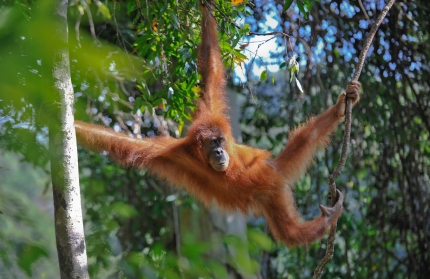
Disney, RAN and the Rainforest
Disney, RAN and the Rainforest
Posted On: Monday, October 15, 2012
When companies are criticized by activist groups for social responsibility failings it can be hard to determine what the degree of the problem is from media coverage and press releases.
The ultimate resolution may represent sweeping change in corporate policies that would not have happened at all or as quickly but for the activist group’s campaign. Or it could mean a company is being held accountable for doing what it had said it would do. It could also mean that a company is being made an example to further a cause.
 Statistics on rain forest deforestation are hard to dispute given the disappearance of rain forests. Stopping deforestation is a paramount focus of the Rainforest Action Network (RAN).
Statistics on rain forest deforestation are hard to dispute given the disappearance of rain forests. Stopping deforestation is a paramount focus of the Rainforest Action Network (RAN).
After attacks by RAN in May 2011 over what it described as Disney’s “use of fiber from endangered Indonesian trees in the 50 million children’s books it publishes each year,” Disney announced October 11, 2012 its new paper use and sourcing policies. The policies minimize paper consumption, and maximize recycled content and fiber sourced from certified forestry operations.
In its press release, Disney quotes a RAN official who commends Disney “for adding its significant voice to the growing chorus of companies demonstrating that there’s no need to sacrifice endangered forests or animals for the paper we use every day.”
In the 2011 protest, RAN activists dressed as Mickey and Minnie mouse chained themselves to Disney’s Burbank, CA gates under a banner saying “Disney: Destroying Indonesia’s Rainforests.”
Not the kind of attention companies want, which is no secret to RAN.
Disney was depicted by RAN as resisting changing its paper sourcing policies (hence the fence chaining). It indicated most of the 10 largest publishers of children’s books changed faster after RAN released a report in 2010 documenting that nine of the top 10 publishers were printing books on paper that endangered the Indonesian rainforests.
The study was an analysis of 30 books (three from each publisher). The findings were that 60 percent of the books had fiber from endangered Indonesia rainforests.
Disney’s 2010 Corporate Responsibility Report already specified “that the company seeks to have 100 percent of paper sourced for product and packaging by its non-licensed businesses be sustainable. The paper sourced will contain recycled content, be sourced from certified forests, or be of known source origin.”
The target date for completion related to paper in books and magazines was 2011. For paper products in other non-licensed businesses, they were to have a timeline for achieving the target in 2011.
However, in the 2012 Corporate Responsibility Report, while specifying that the 2010 goal was met in 2011, a qualifier indicated that the goal “at this time” did not extend to some non-licensed publishing businesses who had inserts by advertisers or third parties in some books or magazines.
The new paper use and sourcing policies announced this month will be implemented in two phases. The first phase addresses paper sourced directly by Disney or on its behalf “for use in Disney-branded products and packaging, and the second will address paper sourced by the company’s independent licensees.” Disney indicated it would report annually on its progress.
Question: How is this different from what Disney was already doing?
Posts by Category
Archive
Most Recent
Gael has proven to be a source of thoughtful and actionable advice on issues related to corporate culture and ethics. Her academic knowledge is a useful supplement to her practical experience and tailored advice.

[…] See original here: The Week in Ethics: Disney, RAN and the Rainforest « Gael O'Brien … […]
[…] When companies are criticized by activist groups for social responsibility failings it can be hard to determine what the degree of the problem is from media coverage and press releases. The ultimate resolution may represent … […]
[…] on theweekinethics.wordpress.com Share this:TwitterFacebookLike this:LikeBe the first to like this. This entry was posted in […]